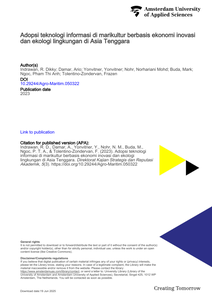With the rise of the knowledge-based economy in Asia, Western-dominated organizational literature is being exported to Asian countries. There is a huge interest from businesses and universities in China, Korea, Taiwan, Indonesia, Malaysia, Singapore, and other countries in Asia and the Middle-East to learn about Western management ideas and techniques in the area of knowledge and intellectual capital management. There is, however, little insight into the success of management ideas and techniques that are based on Western conceptualizations of knowledge in an Asian context.
DOCUMENT

Isu KunciPolicy Brief ini memuat poin-poin penting sebagai berikut :1) Adopsi teknologi informasi untuk industri perikanan.2) Pentingnya ekonomi inovasi pada rantai nilai budidaya perikanan laut dan darat.3) Evaluasi teknik budidaya dan ekologi lingkungan dalam memilih teknologi informasi.RekomendasiPenerapan teknologi informasi pada di Marineculture di Asia Tenggara, yang berfokus pada inovasi ekonomi dan ekologi lingkungan, sangat penting bagi pembangunan berkelanjutan. Rekomendasi yang diberikan adalah melalui pendekatan dan aplikasi: (1) Transformasi Digital. Hal ini mencakup peningkatan infrastruktur, promosi e-commerce, dan pengembangan kewirausahaan digital. (2) Pengembangan Sains, Teknologi & Inovasi: harus dipandang sebagai investasi untuk mendorong pertumbuhan ekonomi dan kemajuan teknologi berbasis Ekonomi Digital. (3) Adopsi dilakukan dengan Transisi Ramah Lingkungan agar pengembangan teknologi berkontribusi terhadap ekologi lingkungan. (4) Dukungan penuh dari pemerintah melalui kebijakan pemberian kredit finansial dan penyuluhan tentang aplikasi teknologi berbasi IoT kepada pembudidaya ikan kecil. Oleh karena itu, negara-negara Asia Tenggara harus memanfaatkan teknologi untuk inovasi ekonomi sambil memastikan kelestarian lingkungan melalui penerapan praktik dan kebijakan ramah lingkungan.
DOCUMENT

In recent years, the importance of sustaining social innovation initiatives, onceinitiated, has gained increasing attention and, in particular, the role that design(ers) can play in this process. However, both the academic study and the practice of design and social innovation are currently lacking sufficient insight into how initiatives are sustained outside of experimental or academic settings and rarely move beyond the involvement of designers and/or researchers. The paper shares experiences from practitioners from Asia-Pacific that are operating in the real world, highlighting their precarious working conditions. The significance of building and maintaining healthy social relations in essential in this context, as these enable the weaving of a strong social fabric around the initiatives that will provide necessarily shelter and to endure long after the practitioners’ involvement. Therefore, facilitating the creation of meaningful social relations should be the key objective for design, instead of designing artefacts.
DOCUMENT

aphasia, speech apraxia, blended careDeze aanvraag is onderdeel van een structureel samenwerkingsverband van het UMCG Centrum voor Revalidatie met de Hanzehogeschool, afdeling Logopedie en de RUG, afdeling Taalwetenschappen, University College of Groningen en Universitair Ziekenhuis Gent. Het project heeft ten doel het verbeteren van de kwaliteit van de logopedische behandeling van spraak- en taalstoornissen na hersenletsel. Hierbij staat telkens het verbinden van theoretische inzichten uit de literatuur met klinisch opgedane inzichten voorop.
The growing demand for both retrofitting and refitting, driven by an aging global fleet and decarbonization efforts, including the need to accommodate alternative fuels such as LNG, methanol, and ammonia, offers opportunities for sustainability. However, they also pose challenges, such as emissions generated during these processes and the environmental impacts associated with the disposal of old components. The region Rotterdam and Drechtsteden form a unique Dutch maritime ecosystem of port logistics, shipbuilding, offshore operations, and innovation facilities, supported by Europe’s largest port and world-class infrastructure connecting global trade routes. The Netherlands’ maritime sector, including the sector concentrated in Zuid-Holland, is facing competition from subsidized Asian companies, leading to a steep decline in Europe’s shipbuilding market share from 45% in the 1980s to just 4% in 2023. Nonetheless, the shift toward climate-neutral ships presents economic opportunities for Dutch maritime companies. Thus, developing CE approaches to refitting is essential for promoting sustainability and addressing the pressing environmental and competitive challenges facing the sector and has led companies in the sector to establish the Open Joint Industry Project (OJIP) called Circolab of which this PD forms the core.
This Professional Doctorate (PD) project explores the intersection of artistic research, digital heritage, and interactive media, focusing on the reimagining of medieval Persian bestiaries through high dark fantasy and game-making. The research investigates how the process of creation with interactive 3D media can function as a memory practice. At its core, the project treats bestiaries—pre-modern collections of real and imaginary classifications of the world—as a window into West and Central Asian flora, fauna, and the landscape of memory, serving as both repositories of knowledge and imaginative, cosmological accounts of the more-than-human world. As tools for exploring non-human pre-modern agency, bestiaries offer a medium of speculative storytelling, and explicate the unstable nature of memory in diasporic contexts. By integrating these themes into an interactive digital world, the research develops new methodologies for artistic research, treating world-building as a technique of attunement to heritage. Using a practice-based approach, the project aligns with MERIAN’s emphasis on "research in the wild," where artistic and scientific inquiries merge in experimental ways. It engages with hard-core game mechanics, mythopoetic decompressed environmental storytelling, and hand-crafted detailed intentional world-building to offer new ways of interacting with the past that challenges nostalgia and monumentalization. How can a cultural practice do justice to other, more experimental forms of remembering and encountering cultural pasts, particularly those that embrace the interconnections between human and non-human entities? Specifically, how can artistic practice, through the medium of a virtual, bestiary-inspired dark fantasy interactive media, allow for new modes of remembering that resist idealized and monumentalized histories? What forms of inquiry can emerge when technology (3D media, open-world interactive digital media) becomes a tool of attention and a site of experimental attunement to cosmological heritage?
Centre of Expertise, part of Hanze